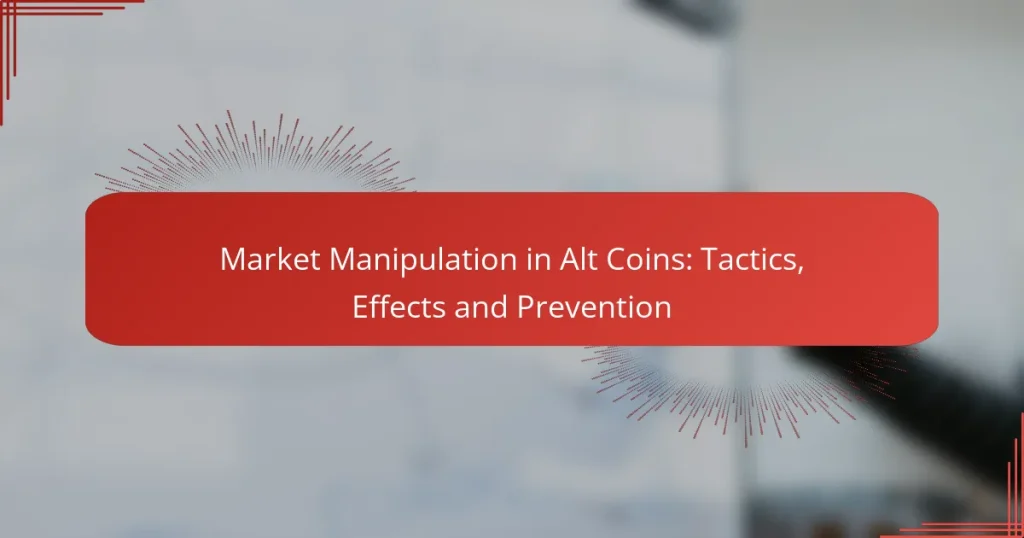Market manipulation in altcoins encompasses various tactics that traders employ to artificially influence cryptocurrency prices, often resulting in significant financial losses for unsuspecting investors. Such manipulative practices create an unstable trading environment, leading to misled investors and diminished trust in the market. To combat these issues, effective prevention strategies, including regulatory compliance and investor education, are essential for fostering a more secure trading landscape.
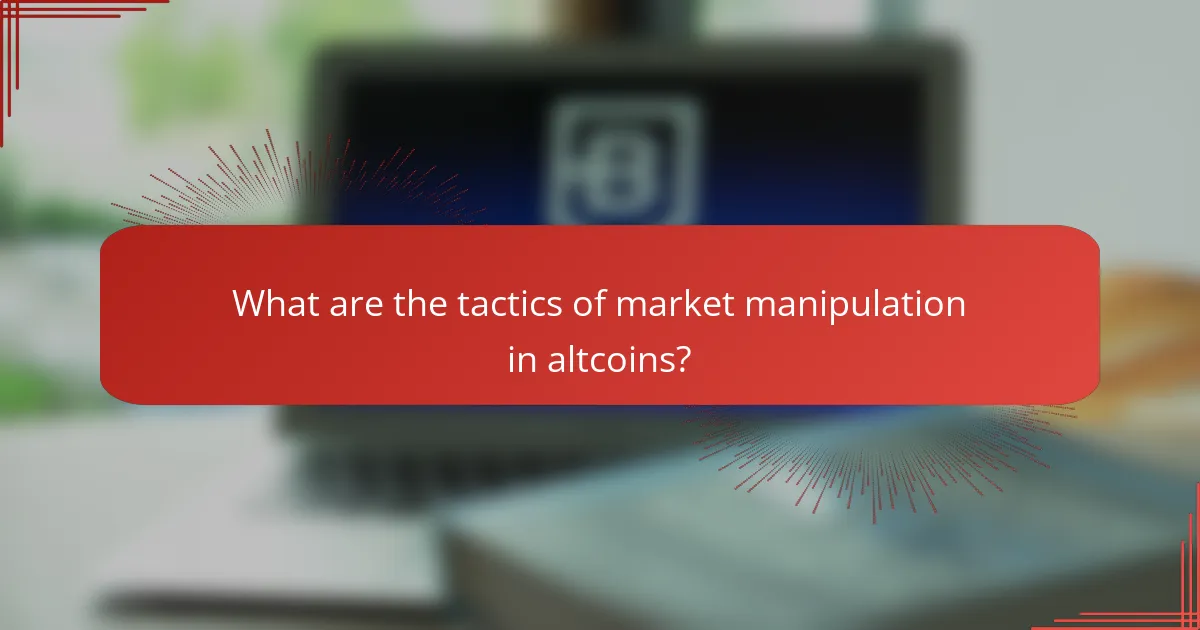
What are the tactics of market manipulation in altcoins?
Market manipulation in altcoins involves various tactics that traders use to artificially influence the price of cryptocurrencies. These tactics can lead to significant financial losses for unsuspecting investors and create an unstable trading environment.
Pump and dump schemes
Pump and dump schemes involve artificially inflating the price of an altcoin through misleading or exaggerated claims, followed by selling off the asset at the peak price. This tactic often targets low-volume coins, making it easier to manipulate their price.
Investors should be cautious of sudden price spikes and high trading volumes, especially when accompanied by hype on social media or forums. A common pitfall is to buy into the hype without verifying the legitimacy of the claims.
Wash trading
Wash trading occurs when a trader buys and sells the same asset simultaneously to create misleading activity in the market. This tactic can give the illusion of increased demand, prompting other investors to enter the market.
To identify wash trading, look for unusual trading patterns where the same entity appears to be both the buyer and seller. Regulatory bodies in some jurisdictions are cracking down on this practice, but it remains prevalent in less regulated markets.
FUD (Fear, Uncertainty, Doubt)
FUD tactics involve spreading negative information or rumors about an altcoin to create panic among investors, leading to a sell-off. This can be done through social media, news articles, or forums, often without any factual basis.
Investors should verify information from credible sources before reacting to negative news. A common strategy is to maintain a diversified portfolio to mitigate the impact of FUD on any single asset.
Insider trading
Insider trading in altcoins involves individuals with non-public information about a cryptocurrency making trades based on that knowledge. This practice is illegal in many jurisdictions and undermines market integrity.
To protect against insider trading, investors should be wary of sudden price movements that coincide with news releases or announcements. Transparency and regulatory compliance are crucial for maintaining trust in the market.
Rug pulls
A rug pull occurs when developers of an altcoin abandon the project and take investors’ funds, often after generating significant hype. This tactic is common in decentralized finance (DeFi) projects and can lead to total loss for investors.
To avoid rug pulls, investors should conduct thorough research on projects, including the team behind them and their track record. Look for red flags such as anonymous developers or lack of transparency regarding the project’s goals and funding.
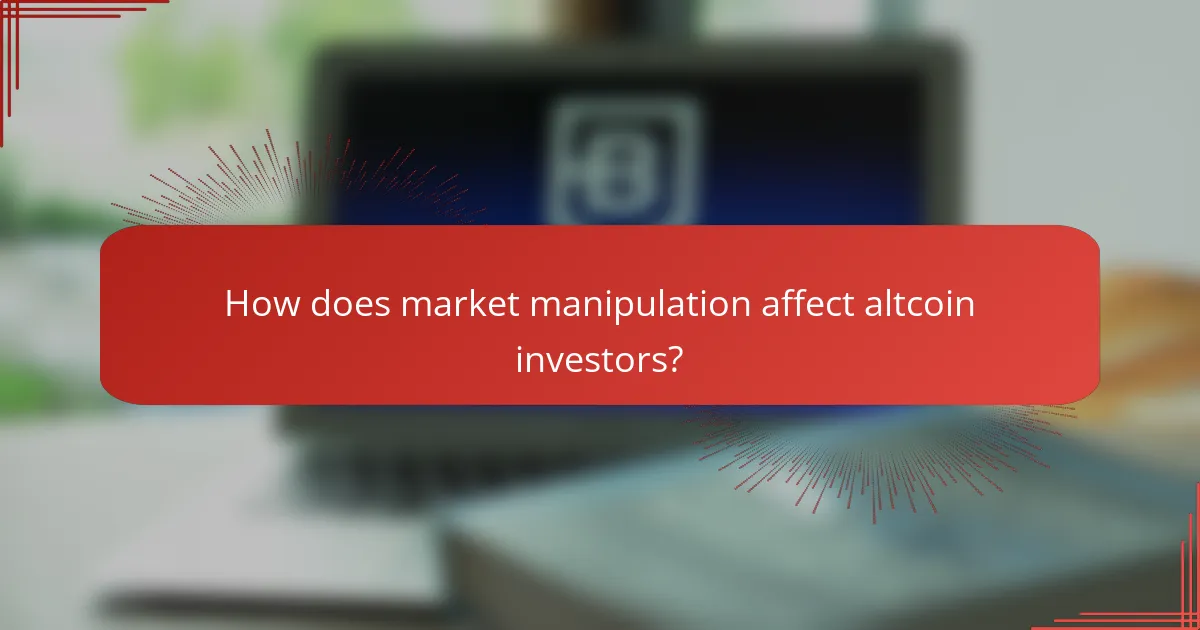
How does market manipulation affect altcoin investors?
Market manipulation significantly impacts altcoin investors by creating artificial price movements that can lead to financial losses and increased uncertainty. Investors may find themselves misled by deceptive tactics, resulting in poor decision-making and diminished trust in the market.
Loss of capital
Market manipulation can lead to substantial losses for altcoin investors. When prices are artificially inflated through tactics like pump-and-dump schemes, unsuspecting investors may buy in at high prices, only to see the value plummet once the manipulators sell off their holdings. This can result in losses that range from a few percent to complete capital loss for those who entered at the peak.
To mitigate the risk of capital loss, investors should conduct thorough research and be cautious of sudden price spikes or unusual trading volumes that may indicate manipulation. Setting stop-loss orders can also help protect investments from drastic downturns.
Market volatility
Market manipulation contributes to increased volatility in altcoin markets, making prices fluctuate wildly in a short period. This volatility can deter long-term investors and create an environment where only short-term traders thrive, which may not align with the investment strategies of many individuals.
Investors should be aware of the potential for extreme price swings and consider diversifying their portfolios to buffer against volatility. Monitoring market trends and using technical analysis can also help in making informed trading decisions during turbulent times.
Trust erosion
Repeated instances of market manipulation can erode trust among altcoin investors, leading to skepticism about the integrity of the entire market. When investors feel that they cannot rely on fair pricing, they may withdraw their investments or avoid altcoins altogether, stifling market growth.
To rebuild trust, the altcoin community must advocate for transparency and regulatory measures that deter manipulation. Investors can support projects that prioritize ethical practices and engage in communities that promote accountability and education regarding market dynamics.
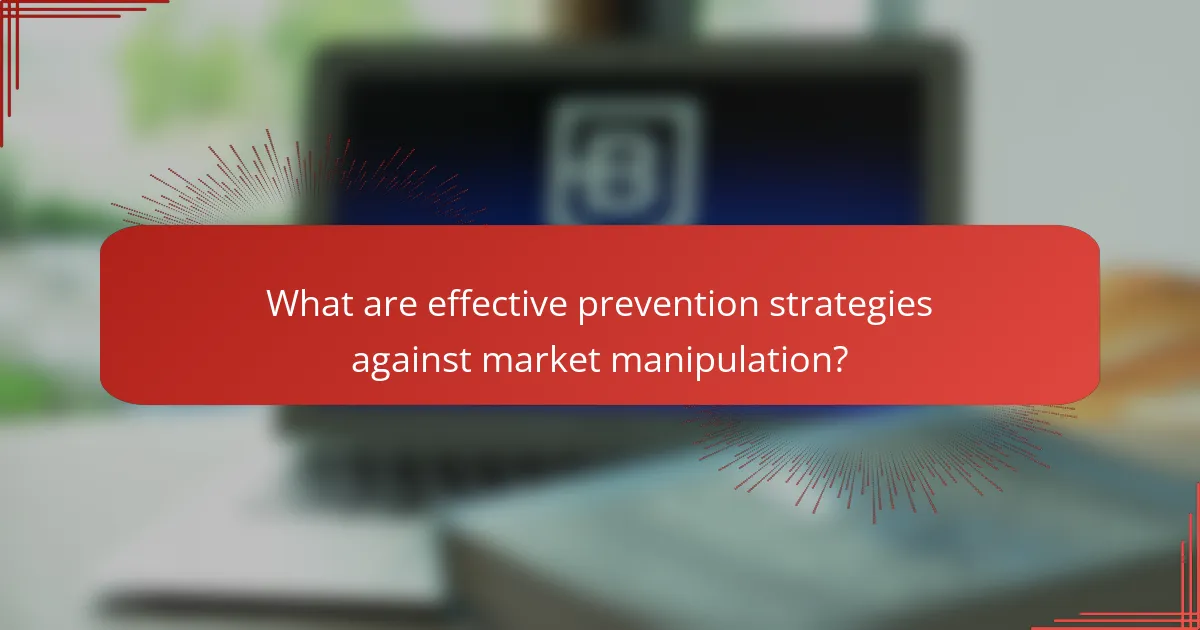
What are effective prevention strategies against market manipulation?
Effective prevention strategies against market manipulation include regulatory compliance, investor education, and leveraging blockchain transparency. These tactics help create a more secure trading environment and protect investors from fraudulent activities.
Regulatory compliance
Regulatory compliance involves adhering to laws and regulations set by governing bodies to ensure fair trading practices. In many countries, such as the United States and those in the European Union, regulations require exchanges to implement measures that prevent market manipulation.
Key steps include regular audits, reporting suspicious activities, and ensuring that all trading practices align with established legal frameworks. Non-compliance can lead to severe penalties, including fines and loss of trading licenses.
Investor education
Investor education is crucial in helping individuals recognize and avoid market manipulation tactics. By understanding common schemes, such as pump-and-dump or wash trading, investors can make informed decisions and protect their investments.
Educational programs and resources, including webinars, articles, and community forums, can empower investors with the knowledge to identify red flags. Encouraging due diligence and critical analysis of market trends can further reduce susceptibility to manipulation.
Use of blockchain transparency
Blockchain transparency enhances market integrity by providing a public ledger of all transactions. This allows investors to trace the history of an asset and verify its legitimacy, making it harder for manipulators to execute fraudulent schemes.
Projects that prioritize transparency often implement features such as real-time transaction tracking and open-source code. These practices foster trust among investors and deter potential manipulators from engaging in deceptive activities.
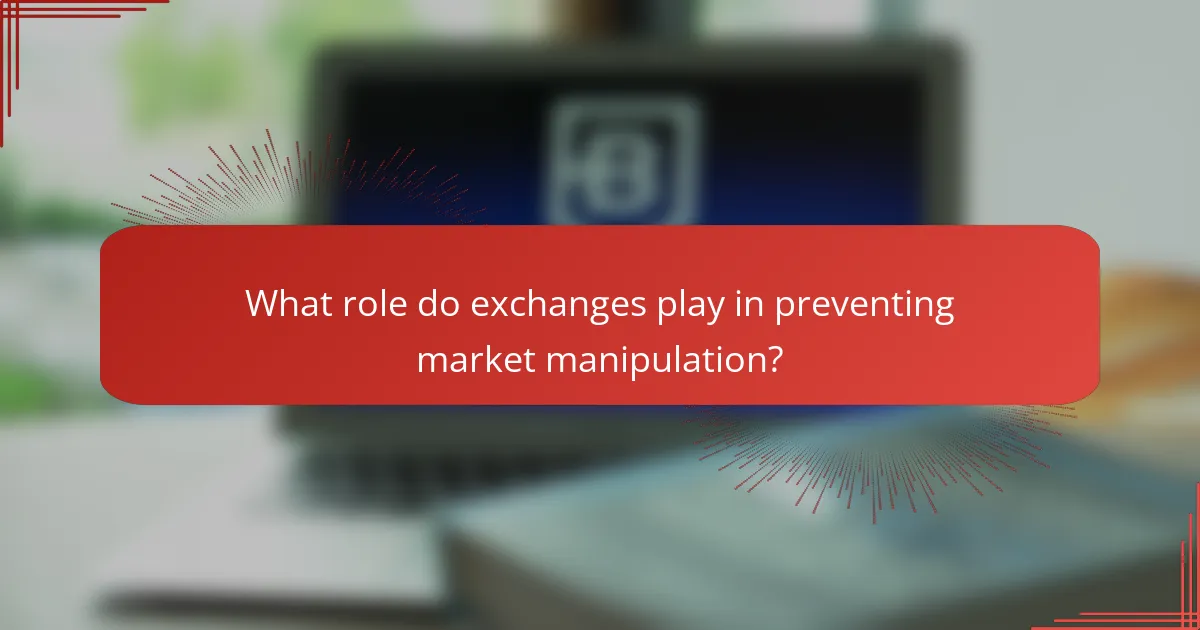
What role do exchanges play in preventing market manipulation?
Exchanges play a critical role in preventing market manipulation by implementing various safeguards and monitoring practices. These measures help maintain market integrity and protect investors from fraudulent activities.
Implementing trading limits
Exchanges often set trading limits to curb excessive speculation and prevent price manipulation. These limits can include maximum order sizes, daily trading caps, or restrictions on the number of trades per user within a specific timeframe.
For instance, an exchange might impose a limit of $10,000 on a single trade or restrict users to a maximum of 50 trades per day. Such measures help to stabilize the market and reduce the risk of sudden price swings caused by a few large transactions.
Monitoring trading patterns
Exchanges actively monitor trading patterns to identify unusual activities that may indicate manipulation. They utilize algorithms and analytics to detect irregularities, such as rapid price changes or a sudden influx of orders from a single account.
By analyzing trading data, exchanges can flag suspicious behavior for further investigation. For example, if a user consistently places large buy orders just before a price spike, this could trigger a review to ensure compliance with market regulations.
Enforcing KYC/AML policies
Know Your Customer (KYC) and Anti-Money Laundering (AML) policies are essential tools for exchanges to prevent market manipulation. KYC requires users to verify their identities, while AML policies help detect and report suspicious transactions.
Exchanges typically require users to submit identification documents and proof of address. This process not only helps to ensure that users are legitimate but also makes it more difficult for malicious actors to engage in manipulative practices anonymously.
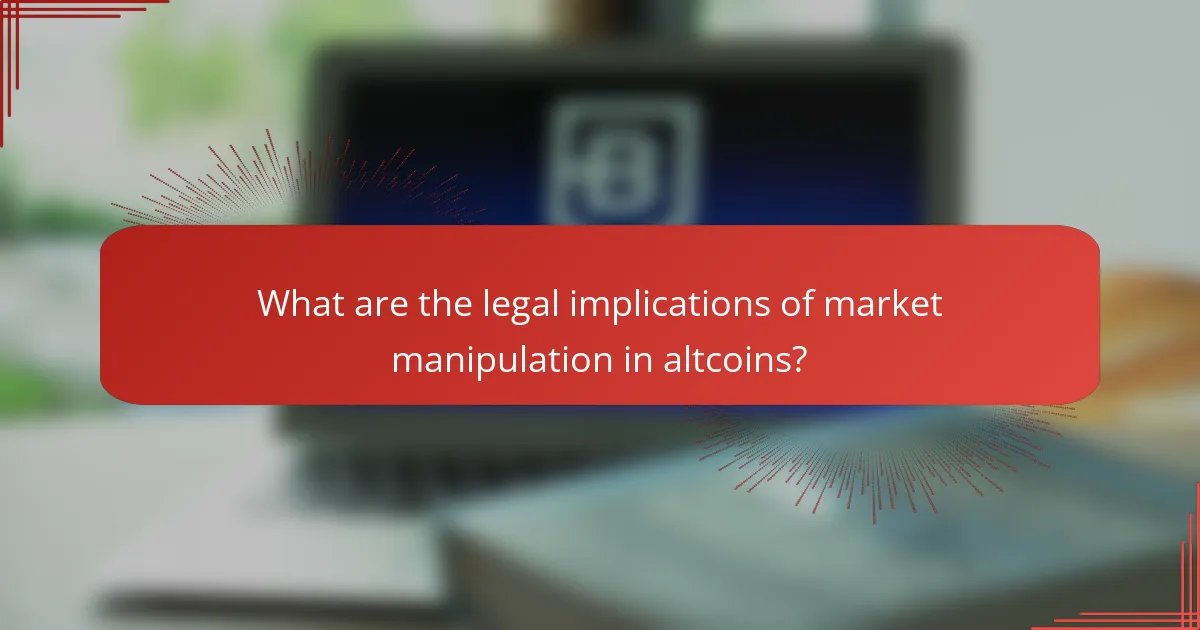
What are the legal implications of market manipulation in altcoins?
Market manipulation in altcoins can lead to significant legal consequences, including fines and criminal charges. Regulatory bodies, such as the U.S. Securities and Exchange Commission (SEC), actively monitor and enforce laws against deceptive practices in cryptocurrency markets.
Regulatory penalties
Regulatory penalties for market manipulation can vary widely depending on the jurisdiction and the severity of the offense. In the United States, individuals found guilty of manipulating altcoin markets may face fines that can reach millions of dollars, along with potential imprisonment.
In Europe, similar regulations exist under the Market Abuse Regulation (MAR), which prohibits insider trading and market manipulation. Violators may incur hefty fines or sanctions from national regulatory authorities, which can impact their ability to operate in the market.
To avoid penalties, traders should adhere to transparent trading practices, avoid spreading false information, and ensure compliance with local regulations. Keeping records of transactions and communications can also be beneficial in case of regulatory inquiries.
